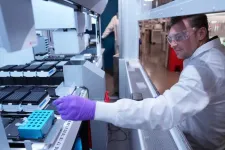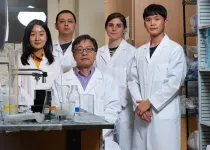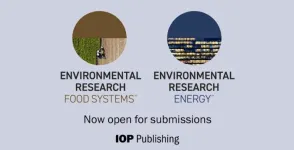(Press-News.org) Breast milk from each individual contains a unique assemblage of antibodies that are surprisingly stable throughout lactation and across pregnancies, according to a new Journal of Experimental Medicine study from the University of Pittsburgh School of Medicine.
As a baby’s early immunity is directed by antibodies from breast milk, the new research provides insight into why protection against different infections varies among infants and why some develop a life-threatening gut disease called necrotizing enterocolitis (NEC).
“While each milk donor in our study had very different antibody profiles from one another, we found that antibodies from the same donor were quite similar over time — even across the span of months,” said senior author Timothy Hand, Ph.D., associate professor of pediatrics and immunology at Pitt’s School of Medicine and UPMC Children’s Hospital of Pittsburgh. “This means that if a baby’s parent happens to lack particular antibodies — such as those that fend off NEC, they’re never going to receive that immunity. This could help explain why some babies get NEC and others don’t.”
According to Hand, NEC is a devastating inflammatory gut disease that mainly affects preterm infants. NEC, which has been linked with a family of bacteria called Enterobacteriaceae, is about 2 to 4 times more frequent in formula-fed babies than those fed breast milk.
Before their immune system matures, babies are protected from harmful bacteria by antibodies transferred via the mother’s placenta and through breast milk. These antibodies bind to bacteria in the intestine, preventing them from invading the host.
In an earlier study, Hand and his team found that Enterobacteriaceae in fecal samples of healthy babies were mostly bound by maternal antibodies. In contrast, infants who went on to develop NEC had more bacteria that escaped being bound. Hand suspected that variation in babies’ immunity to NEC was because different mothers passed along different antibodies, and the new study lends support to this idea.
Hand and his team analyzed donor breast milk from the Human Milk Science Institute and Biobank in Pittsburgh and Mommy’s Milk Human Milk Research Biorepository in San Diego. Using an array of different bacteria, they measured which strains each donor’s antibodies bound to.
“Individual donors’ antibody profiles looked completely different, which is what we had expected but were able to show for the first time,” said Hand. “During pregnancy, B cells travel from the intestine to the mammary gland, where they start making antibodies. The mom is trying to protect her infant using antibodies that she uses to protect her own intestine. Different women have led different lives, have different microbiomes and have encountered different infections, so it makes perfect sense that breast milk antibodies would reflect that variability.”
Throughout the breastfeeding period, a mother’s milk changes from highly concentrated protein-rich colostrum into mature milk. To learn whether antibody composition changes, too, Hand and his team compared breast milk from the same donors over time. They also looked at the same donors over multiple pregnancies.
“Not only were antibodies similar in donors across one pregnancy, they were also remarkably stable between infants,” said Hand. “This suggests that when B cells arrive in the breast tissue, they don’t leave. This is important for understanding how babies acquire immunity and how they deal with infections.”
The researchers also asked whether breast milk antibodies were different if a donor delivered preterm.
“Some B cells move to the mammary gland during the third trimester, so we wondered if a person delivers before this trimester is complete, would their milk have fewer antibodies,” said Hand. “The good news was that we found no difference: Individuals who deliver preterm have just as many antibodies and the same diversity as those who deliver full-term.”
Other studies indicate that mother’s own milk is the best food for reducing a premature baby’s likelihood of developing NEC, but if that isn’t available, donor milk is an important substitute or supplement. This milk is sterilized to kill bacteria, but whether this process also affects antibodies had not been tested.
Hand and his team found that pasteurization reduced antibody levels in donor milk. While this likely means that infants fed donor milk receive fewer antibodies than those who get milk directly from their mother, Hand said that more research is needed to understand what levels of antibodies are protective against diseases like NEC.
In the future, better understanding of specific bacteria that are most dangerous for preterm infants at risk of NEC could help researchers develop antibodies that could be added to formula or breast milk to boost immunity.
Other authors who contributed to the research were Chelseá B. Johnson-Hence, M.D., of the University of Texas Southwestern Medical Center; and Kathyayini P. Gopalakrishna, Ph.D., Darren Bodkin, M.B.B.S., Kara E. Coffey, M.D., Ansen H.P. Burr, Ph.D., Syed Rahman, Ph.D., Ali T. Rai, Darryl A. Abbott, Yelissa A. Sosa, M.S., Justin T. Tometich, Jishnu Das, Ph.D., all of Pitt, UPMC or both.
This research was supported by the UPMC Children’s Hospital of Pittsburgh/R.K. Mellon Institute for Pediatric Research, the National Institutes of Health (R01DK120697 and T32AI089443) and March of Dimes.
##
END
Each mom passes unique set of breast milk antibodies to baby
2023-07-18
ELSE PRESS RELEASES FROM THIS DATE:
Life on Earth didn’t arise as described in textbooks
2023-07-18
Life on Earth didn’t arise as described in textbooks
No, oxygen didn’t catalyze the swift blossoming of Earth’s first multicellular organisms. The result defies a 70-year-old assumption about what caused an explosion of oceanic fauna hundreds of millions of years ago.
Between 685 and 800 million years ago, multicellular organisms began to appear in all of Earth's oceans during what's known as the Avalon explosion, a forerunner era of the more famed Cambrian explosion. During this era, sea sponges and other bizarre multicellular organisms replaced small single-celled ...
This is what relatives think about home-based hospital care
2023-07-18
Relatives are a great resource in today's healthcare system. In Norway, relatives' efforts add up to approximately the same number of person-years as provided by the public municipal health and care services.
But the role of relatives is changing. Changes in the age composition of the population, changed social structures and family patterns will affect how many relatives each of us has to support us in the future.
In order to look after relatives in the best possible way, it is necessary to have increased knowledge about relatives' involvement and the need for support in various ...
Howard and Susan Elias make $16.25 million gift to fund cancer neuroscience research at MD Anderson
2023-07-18
HOUSTON ― The University of Texas MD Anderson Cancer Center today announced a
$16.25 million gift from Howard and Susan Elias to accelerate brain tumor and cancer neuroscience research, an emerging field focused on integrating the role of the nervous system in cancer. Howard Elias’ son, Harrison, was diagnosed with brain cancer and underwent successful surgery in 2000. Six years earlier, Howard’s father had died of glioblastoma. These separate diagnoses sparked a giving program over the years, leading to this latest gift which represents ...
Allen Institute for Immunology partners with Lilly to better understand autoimmune disease
2023-07-18
SEATTLE — July 18, 2023 — In a significant milestone for the Allen Institute for Immunology, a division of the Allen Institute, researchers and staff will collaborate with private industry researchers to aid in the detailed molecular understanding of disease, in service of developing new treatments and therapies to improve human health.
Specifically, Allen Institute scientists will work with researchers from Eli Lilly and Company (Lilly) to investigate and profile disease state diversity and biomarkers for drug response involving atopic dermatitis (eczema) and rheumatoid arthritis using Allen Institute-developed ...
Using AI to speed up vaccine development against Disease X
2023-07-18
CEPI, the Coalition for Epidemic Preparedness Innovations, and the Houston Methodist Research Institute (HMRI), have today announced a partnership to combine cutting-edge artificial intelligence (AI) technology with established laboratory techniques to speed up development of future vaccines against novel viral threats (also known as Disease X). HMRI will lead a consortium including experts from Argonne National Laboratory (University of Chicago), J Craig Venter Research Institute, La Jolla Institute, The University of Texas Medical Branch, and The University of Texas, ...
Japanese beetles could spread throughout Washington state in 20 years
2023-07-18
PULLMAN, Wash. – Without intervention, the colorful but devastating Japanese beetle could make its way across the evergreen state within two decades, according to a study of their potential dispersion.
The iridescent, green-and-copper beetles damage plants by “skeletonizing” their leaves, chewing up all the soft green parts between the veins. They eat over 300 plants and pose a serious threat to Washington agriculture as some of their favorite crops include grapes, hops and cherries.
Once established, Japanese beetles are tough to eradicate, but it may be possible to keep them under control, said David Crowder, a Washington State University entomologist.
“These ...
Will artificial intelligence (AI) end civilization? Lero researchers seek public's views on AI and software
2023-07-18
Will artificial intelligence (AI) end civilisation? Researchers at Lero, the Science Foundation Ireland Research Centre for Software and University College Cork, are seeking help determining what the public believes and knows about AI and software more generally.
Psychologist Dr Sarah Robinson, a senior postdoctoral researcher with Lero, is asking members of the public to take part in a ten-minute anonymised online survey to establish what peoples’ hopes and fears are for AI and software in general.
“As the experts debate, little attention is given to what the public thinks – and the debate is raging. Some ...
NIH grant backs Rice U. lab’s sickle cell disease research
2023-07-18
HOUSTON – (July 18, 2023) – Rice University bioengineer Gang Bao and his team have won a 4-year, $2.6 million grant from the National Institutes of Health to address critical questions surrounding the safety and efficacy of using gene editing to treat sickle cell disease.
Because it is caused by a mutation in a single gene, sickle cell disease is a prime candidate for gene editing treatments using tools such as CRISPR-Cas9.
“Sickle cell disease affects over five million people worldwide, and ...
EMBARGOED: Women less likely to be routed to comprehensive stroke centers for large vessel acute ischemic stroke, according to UTHealth Houston research
2023-07-18
Despite having worse stroke symptoms and living within comparable distances to comprehensive stroke centers, women with large vessel occlusion acute ischemic stroke are less likely to be routed to the centers compared to men, according to a new study from UTHealth Houston.
Led by corresponding author Sunil Sheth, MD, associate professor of neurology and director of the vascular neurology program with McGovern Medical School at UTHealth Houston, and senior author Youngran Kim, PhD, assistant professor of management, policy, and community health with UTHealth Houston School of Public Health, the study was published today in the Journal of the American ...
IOP Publishing’s latest Environmental Research series journals now open for submissions
2023-07-18
IOP Publishing’s (IOPP) new environmental research journals are now open for submissions. Announced earlier this year, the two new open access (OA) journals: Environmental Research: Energy and Environmental Research: Food Systems are the latest additions to IOPP’s expanding Environmental Research Series which now includes eight open access titles.
IOPP’s Environmental Research series builds on the established reputation of the journal Environmental Research Letters (ERL) and shares the same outstanding levels of author service, inclusive editorial policies, strict quality assurance and has open science principles at its core.
IOP ...





